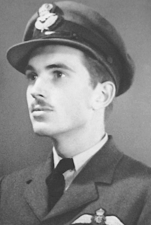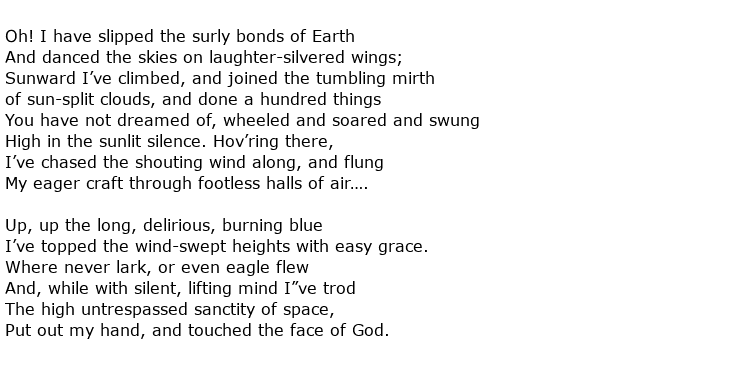 John Gillespie Magee Jr. was an Anglo-American poet and fighter pilot who died tragically young while serving in England with the Royal Canadian Air Force in 1941. He is known for his poignant poetry, honouring Air Force colleagues who had died on active service, and also for an elegy to the war poet Rupert Brooke, a man whose work that he deeply admired.
John Gillespie Magee Jr. was an Anglo-American poet and fighter pilot who died tragically young while serving in England with the Royal Canadian Air Force in 1941. He is known for his poignant poetry, honouring Air Force colleagues who had died on active service, and also for an elegy to the war poet Rupert Brooke, a man whose work that he deeply admired.
He was born on the 9th June 1922 in Shanghai, China. His father was an American Episcopal priest who carried out missionary work in that country while his mother was an English woman who was working at the same mission when they met. John was the first of four boys in the family and was educated firstly at the American School in Nanking before moving to England with his mother in 1931. Following prep school in Walmer, Kent he then went to the prestigious Rugby School where he spent four years between 1935 and 1939.
Already a budding poet he won the school prize for poetry in 1938 following the famous Rugby old boy Rupert Brooke who had also won the prize 34 years earlier. Brooke’s name was on the Roll of Honour commemorating former pupils who had died during the First World War and seeing all those names moved Magee deeply. His prize was for his Sonnet to Rupert Brooke which described the poet’s burial in a peaceful olive grove on the Greek island of Skyros.
Magee went to the United States sometime during 1939 but was prevented from returning to England due to the outbreak of hostilities. He was forced to complete his education at a Connecticut school and would have gone on to Yale University but for the fact that he chose, instead, to enlist into the Royal Canadian Air Force in October 1940. Within a few short months he had qualified as a pilot and was sent, as a new Pilot Officer, to Britain, for operational training in Wales. His first posting was RAF Digby, in Lincolnshire, flying Spitfires.
Magee was inspired by the memory of fighter pilots already lost, especially during the Battle of Britain during 1940. Two of his most famous poems were written in their honour. The poem High Flight was penned shortly after completing a sortie in August 1941 where he remembered some words that he had read in another poem about pilots flying so high that they can reach out and “touch the face of God”. Here is the poem:

This poem was recited by many famous people at the time, including Hollywood stars such as Merle Oberon who was part of a group on tour to raise war funds. American President Ronald Reagan used it in his poignant speech honouring the astronauts who lost their lives in the Challenger disaster in 1986. Many others have used the stirring words of this poem over the years.
Magee’s other famous poem of this era was Per Ardua and the words

which means

is the motto of the Royal Air Force and other Commonwealth air forces. It was possibly his last ever poem and it is believed that he wrote it after experiencing combat for the first time in November 1941. Some have suggested though that he did not have time to complete this piece of work before his death the following month.
John Gillespie Magee died on the morning of 11th December 1941 at the age of 19. He had been flying with other members of his squadron close to their home base and collided with a training aircraft just below the heavy cloud base. He ejected but was too close to the ground for safe parachute deployment. He was buried in Lincolnshire with full military honours.

